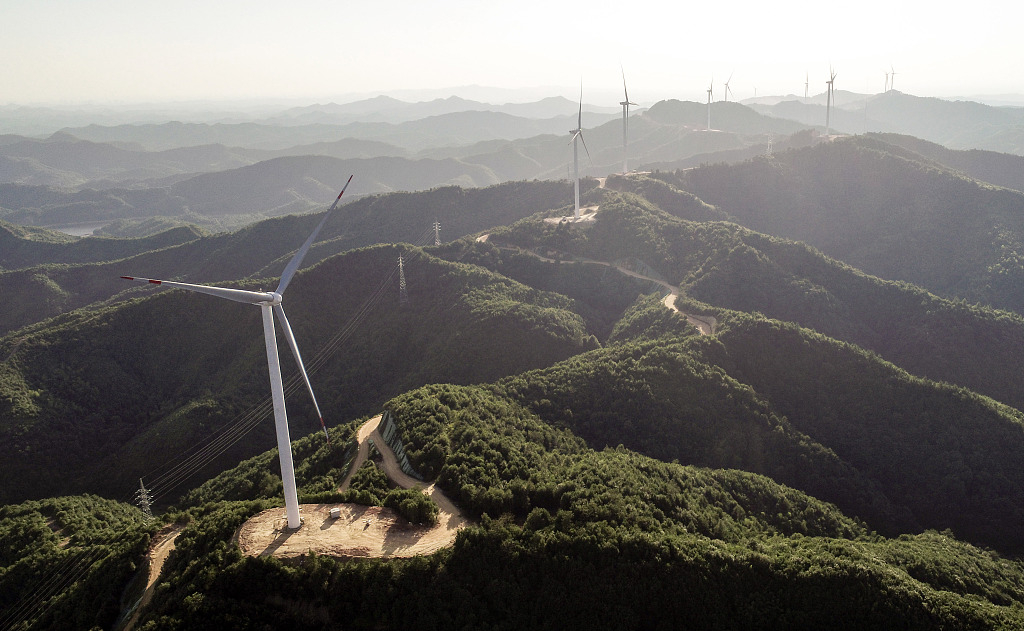
The Eiffel Tower is illuminated in green with the words "Paris Agreement is Done" in Paris, France, November 4, 2016. /VCG Photo
The Eiffel Tower is illuminated in green with the words "Paris Agreement is Done" in Paris, France, November 4, 2016. /VCG Photo
Editor's note: Andrew Korybko is a Moscow-based American political analyst. The article reflects the author's opinions and not necessarily the views of CGTN.
November 4 marks the third anniversary of the Paris Agreement that aims to reduce global emissions and lessen the impact that mankind has had on climate change.
The climate has occasionally changed throughout history, but it's widely believed that the consequences of the original Industrial Revolution and every subsequent one thereafter have unnaturally accelerated these changes in ways that risk making the planet unlivable for future generations because of the excess carbon that's been released into the environment, which in turn, is thought to contribute to the phenomenon of global warming.
This is the unfortunate result of the industrialization that's unprecedentedly improved everyone's standard of living over the past couple of centuries, but there's hope that the sustainable use of natural resources and the curtailment of carbon emissions through cutting-edge technologies can help manage these consequences without disrupting economic development too much.
Although this issue is one around which every person should rally out of mankind's larger interests, it's unfortunately been politicized by some forces for self-interested reasons intended to achieve short-term gains for themselves.
A perfect example of this is in practice is some Western countries' claims that China isn't doing its fair share to abide by the accord, driven by the belief that the unparalleled economic development of China over the past four decades has been disastrous for the environment, to say nothing of the future impact that the Belt & Road Initiative (BRI) is speculated to have on the many countries that are trying to emulate the Chinese model with Beijing's support.
It's understandable that well-intended observers might be concerned about this, but the problem is that many of the criticisms being made neglect some key facts.

A wind power plant in Jiangxi Province, China. /VCG Photo
A wind power plant in Jiangxi Province, China. /VCG Photo
The first is that China is prioritizing the use of renewable energy at home, so much so that its relevant industries, such as the solar one, are now exporting these technologies across the world.
Second, some forces have hijacked the climate debate to push through proposed "solutions" that would, in effect, impose limits on the growth of developing countries given that the current circumstances, the generation of energy through fossil fuels, is the only economically realistic option that many of them have.
They craftily believe that they can disguise their neo-imperialist agenda of undermining their geopolitical rivals through the climate pretext.
The fearmongering narrative that China and the BRI that it backs will ultimately end up making the environment unlivable for future generations conveniently ignores the fact that Beijing is a signatory to the Paris Agreement and fully intends to carry out its commitments in the long run.
The proliferation of fossil fuel-powered energy production plants is only a short-term means to the end of facilitating these countries' development to the point where they can afford the comparatively more expensive climate-friendly technologies that China is implementing at home and increasingly exporting abroad.
Although some studies forecast that carbon emissions in BRI countries might, therefore, increase in the coming years, these findings by themselves don't take into account China's future export of renewable resource technologies to those same countries, which could eventually reduce their emissions and make their economic growth more environmentally sustainable.
Neither China nor any responsible country anywhere in the world wants others to indefinitely remain dependent on the carbon-fueled development that's thought to accelerate climate change and harm the environment, so there's a sincere interest to eventually change this.
Those that criticize China and its BRI for supposedly bringing about the climate apocalypse, therefore, either haven't fully thought this through or have political reasons for propagating that false narrative.
Three years on, the Paris Agreement is still seen as the historic accord that brought mankind together to save the world for future generations, and 30 years into the future, it'll be China's responsible BRI-driven development that makes it possible for every country to afford the climate-friendly solutions for doing so.
(If you want to contribute and have specific expertise, please contact us at opinions@cgtn.com)